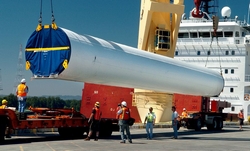forum
library
tutorial
contact

Wind-Turbine Business Propels Port
by Cami JonerThe Columbia, February 5, 2009
|
the film forum library tutorial contact |

|
Wind-Turbine Business Propels Port
by Cami JonerThe Columbia, February 5, 2009 |
 New jobs to handle more wind-energy cargo through 2011 were forecast for the Port of Vancouver during its annual update breakfast on Thursday.
New jobs to handle more wind-energy cargo through 2011 were forecast for the Port of Vancouver during its annual update breakfast on Thursday.
The port has extended a contract with one power company that imports huge wind turbines via the Columbia River and forged a deal with another. Longshoremen offload the shipments with the port's 140-metric-ton mobile harbor crane, construction workers build holding space for them, truckers transport them and the whole region benefits, said Larry Paulson, the port's executive director, in his address to more than 200 people at the Port Re:Port event at the Red Lion Hotel at the Quay. The two new agreements - a three-year extension of the port's contract with Vestas American Wind Technology and a two-year contract with Siemens Energy - could provide 235 new jobs and $20 million in economic value, Paulson said.
"I am proud to announce these two new agreements," Paulson said.
The contracts extend the life of one of the biggest economic coups for Vancouver: handling wind-turbine cargo.
In 2000, Vestas, a wind turbine manufacturer with offices in Portland, and its parent company in Denmark, started shipping product through Vancouver. By 2005, wind machines accounted for 18,551 metric tons of port cargo. The figure rose to 30,423 metric tons in 2006 and 77,525 metric tons by 2007.
Vestas' cargo dropped back to 30,004 tons in 2008, reflecting slower development of wind-energy plants due to uncertainty over federal tax credits for developers of renewable energy, Paulson said.
Congress has since extended the credit, giving developers about 1.9 cents per kilowatt hour - through 2009.
Wind power producers stand to generate even more business in Washington, where the 2006 voter-approved Initiative 937 requires the state's largest utilities to ramp up their portfolios of new non-hydropower sources of renewable energy.
By 2020, the utilities are supposed to generate 15 percent of their total power from new renewable sources, said Marc Krasnowsky, communications director for the NW Energy Coalition based in Seattle.
"That has created a market for businesses like Vestas and Siemens to sell and construct wind facilities in the state, and that's why they're coming through the Port of Vancouver," he said. The tax credit makes wind facilities the cheapest to build, by shaving nearly 2 cents per kilowatt hour off the 10-cents per kilowatt hour it takes to build a new plant. By comparison, a new natural gas generation plant would cost about the same - between 9 cents and 10 cents per kilowatt hour to build.
Potential job growth
Port leaders anticipate regional job growth will be the main result of the port's new wind-energy contracts, said Nancy Baker, president of the port's three-member commission, in her commission address. Baker called the jobs more important than ever as the global and local recession lingers.
"Stable, living-wage jobs are the key to our local economy," Baker said.
Wind energy cargo generated about 14,000 hours of dock work for longshoremen in 2005, a number that grew to 72,000 hours in 2007, Paulson said.
"In 2009, we project over 100,000 longshore hours to handle wind energy cargo," he said.
The port has purchased a second crane for $3.4 million to unload the wind turbines. The crane is expected to be up and running by March 15, Paulson said.
Vast areas of land around the port's four terminals make the site ideal for importing wind-energy cargo, which needs "space to lay during the process," Paulson said.
The port has recently added the 218-acre former Alcoa/Evergreen site to its real estate holdings and will start developing it as a fifth terminal in April.
Other cargo down
Paulson said he expects wind-energy shipments to help make up for other cargo categories that have dropped through 2008.
"Lumber imports have virtually stopped," due to a yearlong decline in regional home building, Paulson said.
Steel and copper imports have also declined, although Subaru automobile imports rose by more than 26 percent.
"No doubt there are challenges," Paulson said.
He added that the local port is in one of the best positions regionally to take advantage of the market for the huge and cumbersome wind-energy cargo, which the Port of Portland does not handle.
"Wind energy products are the bright spot," Paulson said. "When you see them traveling through our community and down our streets, be patient and think about how many jobs they create."
learn more on topics covered in the film
see the video
read the script
learn the songs
discussion forum
